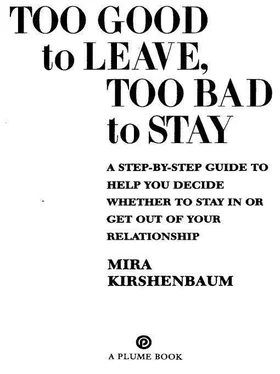Kirshenbaum, Mira - Too Good to Leave, Too Bad to Stay
Здесь есть возможность читать онлайн «Kirshenbaum, Mira - Too Good to Leave, Too Bad to Stay» весь текст электронной книги совершенно бесплатно (целиком полную версию без сокращений). В некоторых случаях можно слушать аудио, скачать через торрент в формате fb2 и присутствует краткое содержание. Жанр: Психология. Описание произведения, (предисловие) а так же отзывы посетителей доступны на портале библиотеки ЛибКат.
- Название:Too Good to Leave, Too Bad to Stay
- Автор:
- Жанр:
- Год:неизвестен
- ISBN:нет данных
- Рейтинг книги:3 / 5. Голосов: 1
-
Избранное:Добавить в избранное
- Отзывы:
-
Ваша оценка:
- 60
- 1
- 2
- 3
- 4
- 5
Too Good to Leave, Too Bad to Stay: краткое содержание, описание и аннотация
Предлагаем к чтению аннотацию, описание, краткое содержание или предисловие (зависит от того, что написал сам автор книги «Too Good to Leave, Too Bad to Stay»). Если вы не нашли необходимую информацию о книге — напишите в комментариях, мы постараемся отыскать её.
Too Good to Leave, Too Bad to Stay — читать онлайн бесплатно полную книгу (весь текст) целиком
Ниже представлен текст книги, разбитый по страницам. Система сохранения места последней прочитанной страницы, позволяет с удобством читать онлайн бесплатно книгу «Too Good to Leave, Too Bad to Stay», без необходимости каждый раз заново искать на чём Вы остановились. Поставьте закладку, и сможете в любой момент перейти на страницу, на которой закончили чтение.
Интервал:
Закладка:
Barbara was silent for a minute and then said, “What difference does it make? Suppose I can. What does that prove? Suppose I can’t? Does that mean it’s over?” Here’s the guideline:
GUIDELINE # 12
In spite of how hurt and deprived you feel, if you are still willing to deliver a concrete expression of love, without expecting anything back in the near future, there’s a real chance there’s a solid core of aliveness in your relationship. If you won’t give unless there’s a clear expectation of getting something in return, that’s evidence you won’t be happy if you stay. Quick take: When there’s nothing left to give, there’s nothing left at all.
The yes answer is the really important one here. If, even though your partner’s been stingy and miserable and angry and critical, even though you keep taking care of your partner and it doesn’t seem as though he takes care of you, you’re still willing to give without expecting to get anything back, that means that when you say “I still love him” you’re not full of bull. Your feelings are about something real.
What do I mean when I talk about “delivering a concrete expression of love,” about “giving” when you don’t feel like giving? I’m not talking about anything dramatic or costly. I’m just talking about small, concrete things that may not be so hard to do but that make a difference to the other person. This kind of concrete expression of love could include things like the following:
• Smiling at your partner when he comes home
• Complimenting your partner on the excellent job she’s done on a pet project
• Stopping to rub your partner’s shoulders when you walk past him
• Picking up something you know your partner will like when you’re at the store
• Conceding some point that’s been a bone of contention between you
• Offering to help your partner when she’s working on something
I can’t tell you what to give or what would work in your relationship if you gave it. But if you are still willing to give something like the things I’ve just mentioned, then that’s a sign that your love is real.
It may still turn out that love is not enough. And in the long run, we’ve all got to feel that we’re getting back from our relationships roughly as much as we’re putting into them. But for right now, you’ve got to know whether the “I love you” you claim is keeping you in the relationship is more than just words.
Keeping Hope Alive
What does a no answer mean? That’s the problem. If someone says to me that they’re just not prepared to give unless they’re going to get something back in return, then I have to ask where change and hope and healing are going to come from. What’s going to make things get better? What’s going to reverse the inexorable process of mutual shutdown? Because if you feel that way, your partner probably feels that way, and the two of you are standing there with your arms folded basically saying that even if you have to wait until the day you die, you’ll wait for the other to make the first move.
But it may only seem that way. Saying you’re unwilling to give unless you get something back sometimes means it really is all over, but it sometimes means you’re just in terrible pain right now. When I gave birth to my babies I used natural childbirth, and that meant I was in the kind of pain I hope never to experience again. If I hadn’t been giving birth I would’ve wanted to die with pain like that. But it wasn’t the pain of death. It was the pain of life, and that made all the difference. In the same way, if you’re in pain in your relationship and the only ray of light is that you love your partner, that pain might just be the kind of pain that goes away.
That’s what happened with Barbara. At first she said, “No. I’m sorry, but I feel wiped out. I have nothing left to give.” But Barbara and I both needed to understand what her no meant. With question #12, only time makes that clear.
I asked Barbara to do what I’m going to ask you to do if your answer is no. On a piece of paper write these words:
As of [today’s date] I just don’t feel willing to give unconditionally to my partner anything more than I’m giving right now.
Then go through the rest of this book. Another question later on might make it clear that you’ll be happier leaving. But if by the time you finish this book the signs are that you’ll be happier staying, do this. Put that piece of paper in your wallet. Look at that piece of paper six months or so from today’s date. If nothing’s changed and you still feel the same way, I feel comfortable saying that you’ll be happiest if you leave.
Here’s what happened with Barbara. She must’ve had a sense that her running on empty had to do with more than just the relationship. So she took a vacation from Sam and the business. If he couldn’t handle that, she thought, that’s all she needed to know. But it was fine with him. So Barbara went to stay for two weeks with her mother in Florida. She got physically rested and emotionally left alone.
What surprised her was that when she got back to her life with Sam she was nice to him again. The pressures and difficulties were still there as they’d been before, and Sam was the same demanding guy he’d been, but it must be true that she loved him because it seemed as though she had some love to give him again.
It wasn’t that alone that made the relationship too good to leave. But when she saw what she was giving to him, she asked herself, “Is there a reason I can’t keep this up forever? Does this cost me anything?” Her answer was no to both questions. And that was a reason to stay.
You’ll be happy to know that in this case the power of giving unconditionally to the relationship turned things around. It didn’t make their relationship at work less stressful, but Barbara gave Sam a present of herself by being nice to him the way he’d remembered before all the difficulties. And Sam responded. He wasn’t a completely new man, but he showed Barbara that he had love to give her that he delivered by being nice back to her. With no other negatives in their relationship making it too bad to stay in, these little but real gifts of love turned mutual shutdown into mutual turn-on.
Every once in a while someone’s afraid to give unconditionally. They feel they do have something left to give but they’re afraid if they actually give it they’ll get screwed, used, suckered into doing all the work in the relationship.
But I want to say that these fears are generally unwarranted. You already know the relationship’s iffy. You’re already thinking of leaving. If you give and nothing happens and you get nothing back, the forces of mutual shutdown are powerful enough to make it likely that you won’t have anything left to give the next time, and you’ll have found the clarity you’re looking for. At least you’ll have tested the reality of your love.
9
It Don’t Mean a Thing If It Ain’t Got That Swing
Issue: Sex and Physical Affection
Here it is. Sex. But I’ve got a surprise for you. In a way this whole book is about sex. Let me explain.
There are all kinds of sexual problems we deal with in our relationships that can drive us nuts, make us miserable, and make us wonder if there’s something wrong with the relationship, something so wrong that maybe we’d be happiest leaving. I’m talking about the whole gamut of sexual problems, such as one of you just not wanting sex, fights over how often you make love and who initiates lovemaking, sex without passion, the desire for more foreplay, sexual needs that one of you has that the other doesn’t want to satisfy, sexual boredom, premature ejaculation, difficulty reaching orgasm, or 101 other sexual problems.
Читать дальшеИнтервал:
Закладка:
Похожие книги на «Too Good to Leave, Too Bad to Stay»
Представляем Вашему вниманию похожие книги на «Too Good to Leave, Too Bad to Stay» списком для выбора. Мы отобрали схожую по названию и смыслу литературу в надежде предоставить читателям больше вариантов отыскать новые, интересные, ещё непрочитанные произведения.
Обсуждение, отзывы о книге «Too Good to Leave, Too Bad to Stay» и просто собственные мнения читателей. Оставьте ваши комментарии, напишите, что Вы думаете о произведении, его смысле или главных героях. Укажите что конкретно понравилось, а что нет, и почему Вы так считаете.












